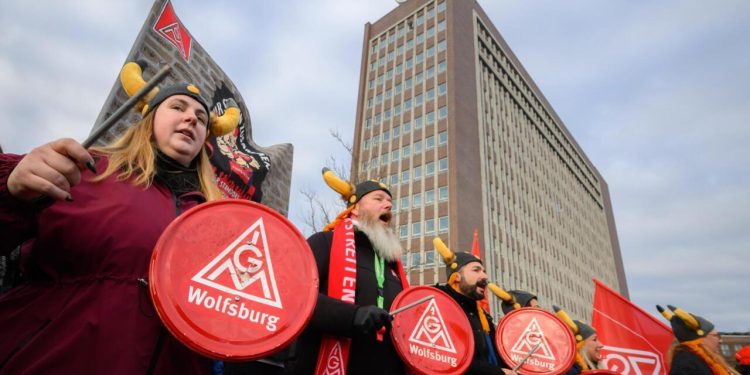Nearly 100,000 workers at the giant carmaker have declared an unprecedented national strike. Since Monday, December 2nd, they have been holding major two-hour work stoppages per shift to reject the bosses’ plans to cut wages by 10%, lay off workers and close some plants for the first time in their history. This is the first major nationwide strike to hit Volkswagen since the post-war period.
The city of Wolfsburg is the epicentre of the conflict. More than 60,000 people work at the factories there directly, and more than 30,000 indirectly, the equivalent to the majority of the city itself, with its 128,000 inhabitants! The strike took place there, along with large demonstrations and street protests by the strikers and the IG Metal union (metalworkers’ union). The industrial action has already started to paralyse the production of cars, including the brand’s flagship car, the VW Golf, which was first produced there in 1974.
In the eastern German city of Zwickau, where the brand’s first plant was set up in 1904, hundreds of workers took to the streets during the two-hour strike, shouting ‘We’ve had enough’. Unsurprisingly, the plant in that city was the first to produce 100% electric cars by 2020. Four years later, the company’s plans have failed and the fall in sales of electric cars, close to 70%, caused a 64% drop in company profits in the third quarter of the year, and they are now looking to make the workers pay for the crisis.
The two-hour strike per shift, together with the demonstrations, are the first measures. The IG Metal negotiator said: ‘If necessary, this will be one of the toughest conflicts that Volkswagen has ever seen’. In the same vein, the negotiator in charge of the negotiations in Wolfsburg said: ‘Anyone who ignores the workers is playing with fire, and we know how to turn sparks into flames!’. In perspective, the conflict seems to have started only recently and is far from being resolved in the forthcoming negotiations.
The VW crisis is part of the global economic crisis. The locomotive of the ‘European economy’ is severely damaged and plunged into a severe recession that also affects other European carmakers. This severe crisis has also had a political impact, bringing down the government of Olaf Scholz, who was forced to bring forward the elections to February this next year. This combination of economic, political and social crises creates a ‘perfect storm’, which causes periods of ‘labour peace’ to explode. Faced with this situation, the workers of Germany and Europe as a whole are looking for a way out, in which strike action, mobilisation and the political independence of those who are fighting will be decisive in order to win against the governments, the capitalists and their austerity plans.













